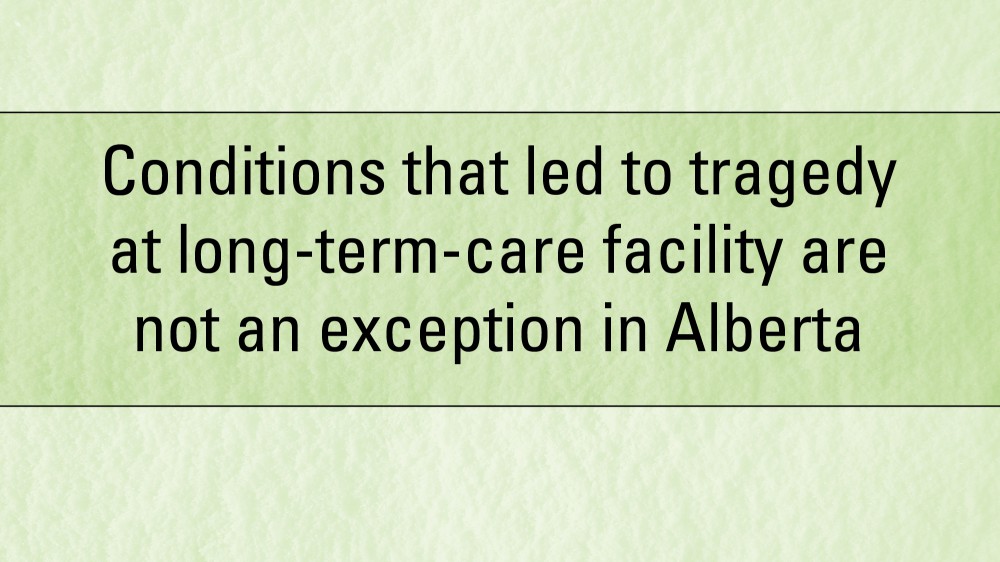Conditions that led to tragedy at long-term-care facility are not an exception in Alberta: UNA President
The death of an elderly resident of a private, for-profit nursing home from neglect and infection should be a wake-up call for the Alberta government that it’s time to start listening to what Registered Nurses have been warning for years, says United Nurses of Alberta President Heather Smith.
Albertans were shocked yesterday to learn that a scathing report by the Alberta Office of Protection for Persons in Care pointed to understaffing and neglect at the Extendicare nursing home in the town of Viking as contributing to the death of 79-year-old Josephine Ewashko in November 2018. The story was broken by the CBC.
“The situation that led to this tragedy is not an exception in Alberta,” Smith said. “Understaffing of the sort reported in Viking is a consistent problem, particularly in private-sector, profit-driven facilities. These issues are systemic, and this requires a response. It must not be dismissed as a problem with one patient in one facility.”
Similar tragedies can strike anywhere in Canada, she added. “There have been repeated calls for a national strategy for long-term care because of the failure by provinces to provide the staffing and other resources necessary for high-quality and safe long-term care.”
Noting that for-profit facilities are funded with public money, Smith said UNA has repeatedly called for minimum staff levels in facilities of this type, as well as enforcement of the provincial regulations that require an RN to be on-site at all times in long-term care (LTC) to ensure adequate monitoring of resident health.
“Some private companies, including Extendicare, have resisted compliance with these important regulations,” Smith said, noting that in 2015 UNA went to court to try to force the company to obey the law at another of its Alberta operations. Stephen Mandel, then the minister of health, had refused to enforce the regulations. Mandel was recently appointed to the Alberta Health Services Board by the Kenney Government.
Abundant scientific research shows the rising number of clinically complex patients in Alberta LTC facilities requires more RNs to assess, coordinate and provide expertise in direct care, Smith said. Among the benefits of increased RN presence in LTC facilities shown by research are lower mortality rates, reductions in required hospitalization of residents, and reduced rates of pressure ulcers and urinary tract infections.
“UNA has reported these findings to the Alberta government on numerous occasions and made sensible recommendations for improving the quality of care in facilities regardless of ownership status,” Smith said. “It’s time for Alberta to listen to its nurses. These regulations are not just ‘red tape.’”
Even today, she pointed out, Extendicare continues to oppose the inclusion of Professional Responsibility Concern (PRC) provisions in its collective agreements with UNA so that nurses can raise concerns about patient and resident care and safety. UNA collective agreements with public institutions have included PRC language since the 1980s.
UNA stands by the recommendations made in its 2016 filing to the government’s review of nursing home regulations:
- Minimum nursing and personal care hours must be maintained in provincial regulations
- The minimum threshold for total nursing and permanent care staffing should be raised to 4.1 hours per resident per day
- The minimum threshold for direct care Registered Nursing should be increased to .75 hours per resident per day
- Continued requirement for an RN on site 24 hours a day
- Increased monitoring of RN, licensed practical nurse, and health care aide staffing hours, including ensuring data collection distinguishes between RN and LNP staffing hours
- Requirements that all Alberta Health Services contracts with for-profit and not-for-profit LTC providers are available for public scrutiny
- Regular public reporting on service quality and compliance in LTC facilities, including staffing hours, as recommended by the Auditor General’s October 2014 report
In 2018, Markham, Ont.-based Extendicare Inc. posted revenue of $1.1 billion from the operation of 122 senior care and retirement living facilities in Canada and the United States. Extendicare’s 2019 financial results are scheduled to be published next month.

